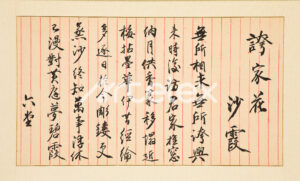Choi Nam-seon (April 26, 1890 – October 10, 1957) was a Korean cultural activist and a key contributor to the development of modern Korean literature. However, he is also remembered as a pro-Japanese collaborator, often mentioned alongside Lee Kwang-soo during the Japanese colonial period. His childhood name was Changheung, his courtesy name was Gongryuk, and his pen name was Yukdang. His family originated from Dongju.
Born in Hanseongbu (modern-day Seoul), Choi spent part of his early years in Cheorwon, Gangwon Province, and Changwon, Gyeongsangnam Province. He initially studied in Japan as a government-sponsored student of the Korean Empire, but after several interruptions, he returned to Korea in 1907 following his expulsion from Waseda University due to a student strike.
In 1908, Choi, along with Lee Kwang-soo, founded the magazine “Sonyeon” (Boys), but it was forced to shut down due to Japanese colonial pressure. He continued publishing other magazines like “Red Jacket” and “New Star,” but all were discontinued under the Joseon Governor-General’s “Press Law.”
Choi played a significant role in the March 1st Movement in 1919 as one of the 49 representatives who declared Korea’s independence, writing and reading the Declaration of Independence. As a result, he was imprisoned but was released in 1921.
In 1922, Choi established Dongmyeongsa and launched the weekly magazine “Dongmyeong.” He also founded the “Sidae Ilbo” newspaper in 1924 but had to close it due to financial difficulties and pressure from the Japanese authorities.
Translation:
Boasting of the Flowers at My Home
With nothing sought between us, there is nothing to boast of.
When the mood strikes, I sometimes cross the sea to visit your home.
Moonlight filters through the cassia wood window, engraving its fragrance,
I move my chair closer to the plum blossoms and dip my brush in ink to paint their beauty.
In the past, I pursued great ambitions for many days,
Now, I carve words and once more steam the sands.
At last, I understand—how fleeting all things truly are.
Futilely, I gaze at the yellow garden, dreaming of the azure twilight.

